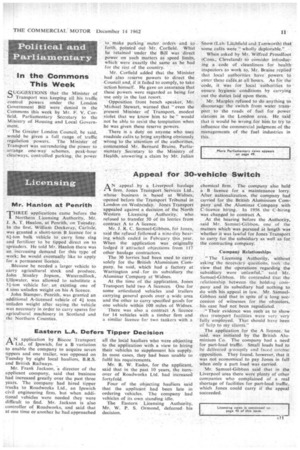Appeal for 30-vehicle Switch
Page 13

If you've noticed an error in this article please click here to report it so we can fix it.
ANappeal by a Liverpool haulage firm. Jones Transport Services Ltd., whose business is based at Widnes, -opened before the Transport Tribunal in London on Wednesday.' 'Jones Transport appealed against a decision of the North Western Licensing Authority; who refused to transfer 30 of its lorries from contract A to A licenee.
Mr. J. R. C. Samuel-GibbOn, fof Jones, said the refusal followed a nine-day hearing which ended in: February this ,year. When the application was originally lodged it attracted objections from 11.7 other haulage contractors.
The 30 lorries had been used to earrY solely for the British Aluminium Company, he said, which had a factory at Warrington and , for its subsidiary the Aluminar Company at Widnes.
At the time of the application, Jones Transport held two A licences. One for some articulated vehicles and trailers carrying general goods over a wide area and the other to carry specified goods for one vehicle within 100 miles of Widnes.
There was also a contract 'A licence for 14 vehicles with a timber firm and a similar licence. for two tankers with ,a
chemical firm. The company also held a B licence for a maintenance lorry. After nationalization, the company had carried for the British Aluminium Company and the Alurninar Company with .C-licence hiring. In 1956, the C-hiring was changed to contract A.
At the hearing before the Authority, said Mr. Samuel-Gibbon, one of the matters which was pursued at length was whether it was lawful for Jones Transport to carry for the subsidiary, as well as for the contracting company.
Company Relationships " The Licensing Authority, without asking the necessary questions. took the view that the operations regarding the subsidiary were unlawful," said Mr, Samuel-Gibbon. He contended that the relationship between the holding conipany and its subsidiary had nothing to do with his appeal in law. Mr. SamuelGibbon said that in spite of a long succession of witnesses for the objectors, his case had not been repudiated.
" Their evidence was such as to show that transport facilities were very very fully employed. That should have been of help to my clients."
The application for the A licence, he said, was initiated by the British Aluminium Co. The company had a need for part-load traffic. Small loads had to be delivered promptly and faced intense opposition. They found, however, that it was not economical to pay Jones in full when only a part load was carried.
Mr. Samuel-Gibbon said that in the Liverpool area there were plenty of other companies who complained of a real shortage of facilities for part-load traffic, which Jones could carry if the appeal succeeded.




















































































































